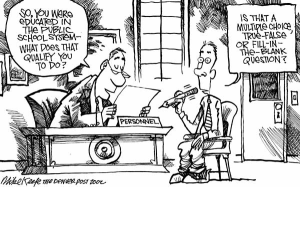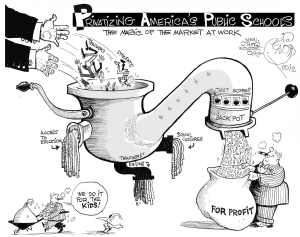The Problem with Choice
By: Pauline Hawkins
Originally posted on her blog here https://paulinehawkins.com/2016/11/27/the-problem-with-choice/
I know too many people who are not educators (and some who are) that are in favor of the choice movement in education. The biggest reason people want choice is to improve the education for their own children and then create competition so that other schools will be forced to improve or shut down. Unfortunately, both reasons are based in misconceptions about education.
I will concede that “choice” is not a bad thing when you are talking about businesses, service industries, and commodities. We definitely want businesses to compete for our money. Competition makes businesses strive for excellence. That’s why people, outside of education mostly, thought that “choice” would make all schools better, but it hasn’t.
Why? First, because education is not a business; it is a human right (Article 26) that is protected as part of our inalienable fundamental rights to which people are entitled simply because they are human beings, “without distinction of any kind, such as race, colour (sic), sex, language, religion, political or other opinion, national or social origin, property, birth or other status.”
In other words, if a business fails, the owners can start over, maybe poorer and a little wiser, but no real harm done. If a school fails, it has negatively affected the human rights of every child that went to that failing school.
So how does the “choice” movement hurt human rights? Bear with me as I try to explain this point.
If you are for “choice” in education, you want better “service” for your child. We all want what is best for our children–I’m not arguing that. But if your child is going to a failing school, and you have the money to pay for private schools, which is part of that choice movement, then you will no longer care about that failing school because you can give your child something better (unless your child makes a mistake which will result in an expulsion with no chance of return to that private school). That is great for you and your family, but what about all the other children who can’t afford to pay for private schools?
The next question is usually, isn’t that why people came up with charter schools, so that people who can’t afford private schools can still get a quality education? Yes. Charter schools, in general, are another great idea–on paper. You don’t have to pay for charter schools out of your own pocket—technically—but your tax dollars go to those schools. Our government gives charter schools a certain amount of money for every child enrolled in that charter school; so just like public schools, our government pays for your child’s education—that is if you are lucky enough to get selected, and your child behaves well enough to stay at that school. Most charter schools operate on a lottery system, so not all students will get in, and most schools will kick students out who make mistakes or make the school look bad in any way.
Once again, for those parents who want choice, this sounds great because those children who are selected have a great atmosphere for learning.
However, what people forget is that there are many students who will have to continue going to that failing school. If you can’t worry about someone else’s children, then just consider this: Pulling your child out of the failing school does not pull them out of the society in which they live. One way or another, the negative effects of that failing school will still affect you and your children.
Just to summarize the first point, education is not a business; it is a human right. Therefore, educational choice is about people only caring about their children—no one else’s. Those who can afford it will choose to pay for their children to go to private schools. Out of those that remain, some parents will apply to charter schools and a few lucky students will get selected. That leaves the rest in public schools because public schools will take every rejected and expelled student and do the best they can to educate those students within the confines of the system. Public schools also have incredible students who are successful despite the “choice” movement.
Is it any wonder our public schools look like they are failing if the wealthy and well behaved students are all going somewhere else? Along these lines, by eliminating the heterogeneous classroom in all three options, it makes it harder for those struggling students to see what work ethic, study skills, and perseverance looks like. On the other hand, a classroom that has students with different genders, talents, abilities, interests, backgrounds, and cultures will help all students work toward a higher standard. The students in heterogeneous schools can relate to the world better because they experience diversity on a daily basis. The homogeneous classrooms found in private and charter schools miss out on this necessary part of children’s education. Also, when you remove the top tier of motivated students, the learning culture deteriorates on multiple levels. Students with average ability, motivation, or interest lose that interest, and kids who struggle for whatever reason just give up. Remember, we want our children to be civic-minded and global citizens. How can they understand the global world or empathize with the struggles in our society if they grow up only relating to people just like them?

http://standardizedtests.procon.org/view.resource.php?resourceID=4346
Denver Post cartoon satirizing the effect of standardized tests on public education.
Denver Post cartoon satirizing the effect of standardized tests on public education.
Second, it is important to note that private and charter schools don’t operate under the government’s watchful eye, which allows them to reject the highly controversial Common Core State Standards (CCSS) and refuse to participate in the corresponding state tests. Since these schools operate independently, they don’t have to participate in the very reasons that people are complaining about public schools. As a matter of fact, many private and charter schools saw the CCSS as a flawed document right from the start and opted out of it.
Remember, CCSS and the state tests are mandated for public schools by the government, while at the same time, the government is pushing for more charter schools that do not have to follow the mandates of the government. Does that make sense? So how can this “choice” movement improve the quality of all schools, when public schools don’t have the autonomy to fix their schools?
Third, to make matters worse, the government is giving money to private and charter schools because of that “choice” movement in the form of vouchers—money that could be given to public schools to improve those failing schools. Of course private and charter schools are going to appear as the right “choice” when they have money to purchase the newest technology, have the freedom to be innovative, and can reject the foolish educational reforms that are more about money than about our children.
Those outside of education do not understand that public schools cannot choose to change their operating methods, so it is impossible for public schools to compete in this so called “business market.” Besides the fact that education is a human right and not a business, the business competition model cannot change public schools because public schools are at the mercy of the government that continues to cut the budget of public schools to pay for tests and to give vouchers to private and charter schools.
Fourth, people and the government are not paying attention to the problems with some charter schools. John Oliver did this great piece on charter schools that exposed the problems with the government funding these unregulated entities. Many “nonprofit” charter schools are finding deceptive was to make a profit. Once again, if “choice” education is supposed to create competition and a striving for excellence among all schools, Oliver’s research shows how that business model is failing even in the charter school industry.
On the other side of this issue, though, I will admit, there are some amazing charter schools out there. This is my biggest frustration: If there are innovative schools that are working, why can’t we adopt those innovations in public schools?
If parents truly want choice, this is where we as parents and educators need to concentrate our efforts. In Article 26 of the Universal Declaration of Human Rights, the statement that “Parents have a prior right to choose the kind of education that shall be given to their children” should be taken literally and used to fix public education for all, not to give choice only to the wealthy and the fortunate.
If we want true education reformation, we need to make sure the public tax dollars are being used correctly to create an actual choice movement within the public school system itself: Increase money being spent on public education to improve ALL schools, regardless of location; increase teachers’ salaries to create a true competition for quality teachers; increase public school autonomy so that principals and teachers can use their knowledge and experience to innovate and create the right learning environment for their students.
If people are really concerned about choice, they should make sure their local public school is doing what their children need in order to thrive. Imagine a public school that has the elite academic prep curriculum of Phillips Exeter Academy for those students who are college bound; the innovation of The Ron Clark Academy for those who are creative or learn differently; the care and nurturing of the Learning Skills Academy for those with learning disabilities; and The Independent Project (https://youtu.be/RElUmGI5gLc) for those who want independence and a nontraditional education. Using these innovative schools as models to transform public schools would meet the needs of every student regardless of race, gender, language, religion, political or other opinion, national or social origin, property, birth or other status—not just the wealthy and lucky few.

No comments:
Post a Comment
Note: Only a member of this blog may post a comment.